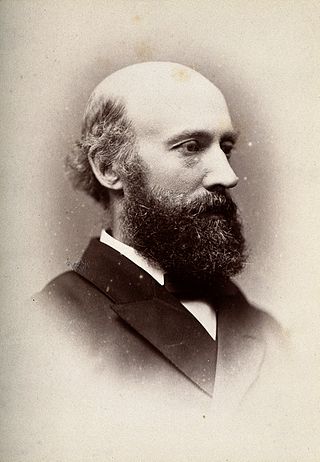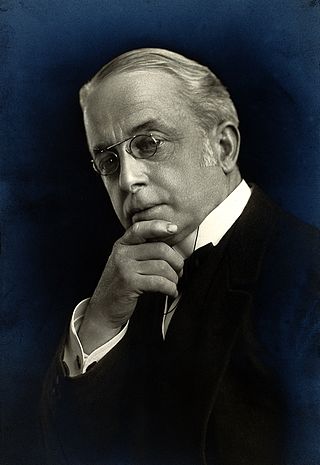Related Research Articles

Robert Liveing (1834–1919) was an English physician and pioneer of dermatology.
George Graham (1882–1971) was a British physician, physiologist, and diabetologist.
Sir William Errington Hume was a British physician and cardiologist.
Clifford Frank Hawkins (1915–1991) was a British gastroenterologist and rheumatologist.

Leslie John Witts (1898–1982) was a British physician and pioneering haematologist.
Peter Wallwork Latham (1832–1923) was an English physician and professor of medicine at the University of Cambridge.
Sir Edmund Ivens Spriggs (1871–1949) was a British physician and medical researcher for gastric and intestinal disorders.
John Crighton Bramwell (1889–1976) was a British cardiologist, professor of medicine, and one of the founders of cardiology as a specialist subject in the UK.
Sir Henry "Harry" Letheby Tidy was a British physician and gastroenterologist.
John David "Jerry" Spillane (1909–1985) was a Welsh neurologist and a pioneer of tropical neurology.

James Alexander Lindsay was a British physician and professor of medicine, known for his collection Medical axioms, aphorisms, and clinical memoranda.
James William Brown (1897–1958) was an English physician, pathologist, and cardiologist.
As a Quaker educated at the Society of Friends School at Sidcot, he served with a Friends Ambulance Unit in France from 1916 to 1919, and was awarded the Croix de Guerre in 1917 for evacuating six wounded soldiers under heavy fire.
Kenneth William Donald (1911–1994) was a British physician, surgeon, pulmonologist, cardiologist, professor of medicine, and leading expert on underwater physiology and exercise physiology.
Judson Sykes Bury (1852–1944) was a British physician, surgeon, and neurologist.
Sir Edward Johnson Wayne was an English physician, biochemist, thyroidologist, and professor of medicine.
James Purdon Martin (1893–1984) was a British neurologist.
Harold Leeming Sheehan (1900–1988) was a British physician, pathologist, and professor of pathology.
Denis John Williams (1908–1990) was a Welsh neurologist and epileptologist.
Charles Edward Kingsley Newman (1900–1989) was a British physician and medical school dean.
References
- ↑ "Aylward Bill". ESASO - European School for Advanced Studies in Ophthalmology. Università della Svizzera italiana. Retrieved 19 February 2012.
- 1 2 "Universities and Colleges". Br Med J. 2 (4361): 198–200. 1944. doi:10.1136/bmj.2.4361.198. PMC 2285981 .
- 1 2 Mayo, Oliver; Carolyn Leach (2007). Fifty years of human genetics. Kent Town, SA: Wakefield Press. p. 149. ISBN 978-1-86254-753-7.
- 1 2 "Munks Roll Details for Ian Michael Pudsey Dawson". RCP Munks Roll. Retrieved 19 February 2012.
- ↑ Patricia-M-Platten. "The Platten's of Woolwich: Information about Richard Horton Smith". Genealogy.com. Retrieved 19 February 2012.
- 1 2 3 Anonymous (2003). Representative British Freemasons. Whitefish, MT: Kessinger Publishing. p. 117. ISBN 978-0-7661-3589-5.
- ↑ "Richard Horton Smith". Google Books. Retrieved 19 February 2012.
- ↑ "Horton-Smith, Raymond John (1873-1899 )". AIM25.
- ↑ Clark, John Willis (1904). Endowments of the University of Cambridge. Cambridge: Cambridge University Press. pp. 434–435.
- 1 2 3 "Raymond Horton-Smith Prize". Statutes and Ordinances of the University of Cambridge. University of Cambridge.
- ↑ "Universities and Colleges". Br Med J. 1 (2112): 1591–1592. 1901. doi:10.1136/bmj.1.2112.1591. PMC 2401149 .
- ↑ "Universities and Colleges". Br Med J. 2 (2167): 159–160. 1902. doi:10.1136/bmj.2.2167.159. PMC 2401323 .
- ↑ Harman, W. M. (1903). "Universities and Colleges". Br Med J. 1 (2217): 1522. doi:10.1136/bmj.1.2217.1522-a. PMC 2514240 .
- ↑ "Universities and Colleges". Br Med J. 1 (3866): 281. February 1935. doi:10.1136/bmj.1.3866.281. PMC 2459622 . PMID 20778848.
- ↑ "Universities and Colleges". Br Med J. 2 (2480): 119. 1908. doi:10.1136/bmj.2.2480.119. PMC 2436979 .
- ↑ "Dale, Henry Hallett". ACAD. Cambridge University Library. Archived from the original on 21 July 2012.
- ↑ "Universities and Colleges". Br Med J. 2 (2583): 58–59. 1910. doi:10.1136/bmj.2.2583.58-a. PMC 2335494 .
- ↑ The Historical Register: Supplement, 1911-20. Cambridge: Cambridge University Press. 1922. pp. 45–46.
- ↑ The Historical Register: Supplement, 1921-30. Cambridge: Cambridge University Press. 1932. pp. 88–89.
- ↑ Newcomb, Wilfrid D. (1932). "The relationship between peptic ulceration and gastric carcinoma". British Journal of Surgery. 20 (78): 279–308. doi:10.1002/bjs.1800207811. S2CID 72598994.
- ↑ "Universities and Colleges". Br Med J. 2 (3802): 945. 1933. doi:10.1136/bmj.2.3802.945-a. PMC 2369513 .
- ↑ "Max Leonard, Baron Rosenheim of Camden Rosenheim". Lives of the fellows. Royal College of Physicians. Retrieved 27 April 2018.
- ↑ "Universities and Colleges". Br Med J. 1 (4128): 279–281. 1940. doi:10.1136/bmj.1.4128.279-a. PMC 2176639 .
- ↑ "Universities and Colleges". Br Med J. 1 (4286): 271–272. 1943. doi:10.1136/bmj.1.4286.271. PMC 2282325 .
- ↑ "Universities and Colleges". Br Med J. 1 (4394): 428–9. March 1945. doi:10.1136/bmj.1.4394.428. PMC 2057063 . PMID 20785981.
- ↑ "Universities and Colleges". Br Med J. 1 (4493): 276–279. 1947. doi:10.1136/bmj.1.4493.276. PMC 2052688 .
- ↑ "Universities and Colleges". Br Med J. 2 (4584): 882–883. 1948. doi:10.1136/bmj.2.4584.882. PMC 2092029 .
- ↑ "Universities and Colleges". Br Med J. 2 (4636): 1119–1122. 1949. doi:10.1136/bmj.2.4636.1119. PMC 2051732 .
- ↑ "Universities and Colleges". Br Med J. 2 (4691): 1284–1286. 1950. doi:10.1136/bmj.2.4691.1284. PMC 2039391 .
- ↑ "Universities and Colleges". Br Med J. 1 (4748): 52. January 1952. doi:10.1136/bmj.1.4748.52. PMC 2022223 . PMID 14896028.
- ↑ "Universities and Colleges". Br Med J. 1 (4801): 104–108. January 1953. doi:10.1136/bmj.1.4801.104. PMC 2015250 . PMID 12997863.
- ↑ "Universities and Colleges". Br Med J. 1 (4854): 163. 1954. doi:10.1136/bmj.1.4854.163. PMC 2084414 .
- ↑ "Universities and Colleges". Br Med J. 1 (4904): 50–51. 1955. doi:10.1136/bmj.1.4904.50. PMC 2060705 .
- ↑ "Munks Roll Details for Edwin Melville Mack Besterman". RCP Munks Roll. Retrieved 19 February 2012.
- ↑ "Universities and Colleges". Br Med J. 1 (5065): 286–288. 1958. doi:10.1136/bmj.1.5065.286-a. PMC 2027044 .
- ↑ "Universities and Colleges". Br Med J. 2 (5163): 1413–1415. 1959. doi:10.1136/bmj.2.5163.1413. PMC 1990960 .
- ↑ "Universities and Colleges". Br Med J. 1 (5221): 302–3. January 1961. doi:10.1136/bmj.1.5221.302. PMC 1953051 . PMID 20789058.
- ↑ "Universities and Colleges". Br Med J. 1 (5271): 119–121. 1962. doi:10.1136/bmj.1.5271.119-d. PMC 1957231 .
- ↑ "Universities and Colleges". Br Med J. 1 (5393): 1321–1326. 1964. doi:10.1136/bmj.1.5393.1321. PMC 1813969 .
- ↑ "Universities and Colleges". Br Med J. 1 (5434): 597–602. 1965. doi:10.1136/bmj.1.5434.597. PMC 2166802 .
- ↑ "Curriculum vitae of George Robert Fraser". Fraser Syndrome Support Group Web site. Archived from the original on 29 July 2012. Retrieved 19 February 2012.
- ↑ Church, J. C. T. (2018). The Satellite Cell of Skeletal Muscle (Doctoral thesis). doi:10.17863/CAM.34269.
- ↑ "Universities and Colleges". Br Med J. 2 (5704): 306–7. May 1970. doi:10.1136/bmj.2.5704.304. PMC 1700435 . PMID 5420199.
- ↑ "Universities and Colleges". Br Med J. 4 (5888): 366–368. 1973. doi:10.1136/bmj.4.5888.366. PMC 1587432 .
- ↑ "Universities and Colleges". Br Med J. 4 (5940): 352–4. November 1974. doi:10.1136/bmj.4.5940.352. PMC 1612895 . PMID 4434110.
- ↑ "Universities and Colleges". Br Med J. 4 (5999): 769. 1975. doi:10.1136/bmj.4.5999.769-a. PMC 1675526 .
- ↑ "Professor Andrew Whitelaw". The web at Bristol. University of Bristol. Retrieved 5 August 2010.
- ↑ "Michael Doherty". Arthritis Research UK Pain Centre. University of Nottingham. Retrieved 19 February 2012.
- ↑ Doherty M, Pattrick M, Powell R (December 1990). "Universities and Colleges". Ann. Rheum. Dis. 49 (12): 1017–20. doi:10.1136/ard.49.12.1017. PMC 1004302 . PMID 2270962.
- ↑ "Aylward Bill". Esaso. Retrieved 19 February 2012.
- ↑ "Professor Thakker receives ASBMR Award". Somerville College, University of Oxford. University of Oxford. Archived from the original on 16 April 2014. Retrieved 11 October 2009.
- ↑ "Awards". Cambridge University Reporter. University of Cambridge. 14 January 1998.
- ↑ "Awards". Cambridge University Reporter. University of Cambridge. 18 November 1998.
- ↑ "Awards". Cambridge University Reporter. University of Cambridge. 15 December 1999.
- ↑ "Awards". Cambridge University Reporter. University of Cambridge. 15 November 2000.
- ↑ "Awards". Cambridge University Reporter. University of Cambridge. 21 November 2001.
- ↑ "Scholarships and Prizes, etc. awarded". Cambridge University Reporter. University of Cambridge. Retrieved 15 December 2010.